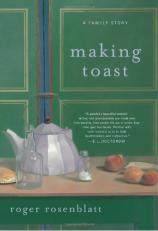Making Toast: A Family Story
Review
Making Toast: A Family Story
There was a time when a brief account of the three generations
of a close-knit family living under the same roof and struggling to
make sense of the sudden death of a young wife and mother
wouldn’t have been all that extraordinary. That it takes
place within the last two years in an affluent household in
Bethesda, Maryland, transforms this plainspoken, heartfelt story
into something remarkable.
While exercising on a basement treadmill in December 2007, Amy
Elizabeth Rosenblatt Solomon, a 38-year-old pediatrician and mother
of three, died suddenly of a rare cardiac anomaly. Her father,
noted journalist Roger Rosenblatt, and mother Ginny immediately
abandoned their spacious Long Island home to settle into a small
room in their daughter’s house to become part of the team
helping to raise three children --- Jessie, Sammy and James
(nicknamed Bubbies) --- ages six, four and one. MAKING TOAST,
expanded from a 2008 New Yorker article, recounts in
quiet, acute detail the ensuing 15 months in the life of this
suddenly blended family.
Choosing to narrate his story in brief vignettes, some as short
as a paragraph, Rosenblatt (known to his grandchildren as Boppo) is
a gifted observer and chronicler of daily life. There are bedtime
stories and birthday parties, temper tantrums and the exquisitely
simple and generous act of preparing breakfast for his three
grandchildren, while offering a new word for them to learn each
morning. “Throughout the winter and the spring, there is
hardly a moment for anything but play, caretaking, schooling,
chauffeuring, and by 9:00 p.m., sleep,” he writes. Out of the
painstaking accretion of modest, homely details, Rosenblatt
describes a process of recovery from devastating loss that’s
more complex and ineffable than any nostrums of healing and closure
offered by well-meaning friends.
Portrayed by Rosenblatt in decidedly sympathetic terms, his
son-in-law Harris, a hand surgeon, “embraces the demands put
upon him with a gusto that dispenses cheer, and in the lulls we try
to keep one another afloat.” His marriage to Amy, as
Rosenblatt describes it, “was like a solid tennis doubles
team. Neither one had to look to see where the other was standing
on the court.” Rosenblatt flavors his story with revealing
glimpses of his daughter, a dedicated professional, devoted friend
and loving parent, spouse and child.
Without explicitly acknowledging it, Rosenblatt comprehends the
good fortune that permits him to maintain his teaching position at
Stony Brook University (which required a weekly five-hour commute
from suburban Washington) while assuming the role of caregiver.
Among its hard-earned gifts, for one, the experience drew him
closer to his wife, Ginny. “After forty-six years of
marriage, due to the most painful of reasons, I am getting to know
my wife,” he writes.
Rosenblatt is not a religious man, and where others might draw
consolation from their faith, his predominant sentiment, frankly
confessed, is a barely-contained fury. “My anger at God
remains unabated,” he writes nearly a year after Amy’s
death, “and it may be that I do not wish to concede Him
anything as good or as kind as providing the superintending
presence of my daughter.” And we struggle with him as wonders
whether he can summon the will to listen to the answering machine
tape of a message Amy left for his daughter-in-law days before her
death.
Like another classic of loss and mourning, Joan Didion’s
THE YEAR OF MAGICAL THINKING, Rosenblatt’s memoir distills
wrenching pain through spare, understated prose that only
underscores the story’s emotional weight. Describing a late
summer scene on a Long Island beach, he observes,
“Constellations of families are spread out on the beach. Ours
does not look very different from the others.” Though he
relies on the usual markers of time --- Christmas, Fourth of July,
the children’s birthdays and the first anniversary of
Amy’s death --- Rosenblatt makes little effort to parse the
blur of days, weeks and months, and thus his portrayal of
time’s flow imparts a sense of life as it’s truly lived
to the book.
Recalling the moment she and Harris first hug after Amy died,
Ginny remembers the widower’s only words: “It’s
impossible.” Doubtless there were days when the task of
rising each morning must have seemed impossible to Rosenblatt and
the grieving adults in his company. And yet they did it, their will
to persevere a tribute to them and a gift to us, innumerable small
moments stitched lovingly together to weave a tapestry of strength
and courage. No one would willingly pay the price that sudden,
inexplicable death exacted from Rosenblatt and his loved ones, and
yet the rewards that they, and those who read about it, have reaped
from their ordeal are incalculable.
Reviewed by Harvey Freedenberg (mwn52@aol.com) on January 6, 2011
Making Toast: A Family Story
- Publication Date: March 1, 2010
- Genres: Nonfiction
- Hardcover: 176 pages
- Publisher: Ecco
- ISBN-10: 006182593X
- ISBN-13: 9780061825934





